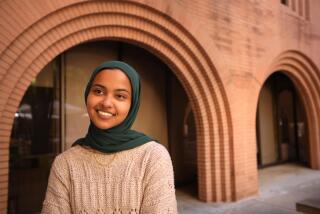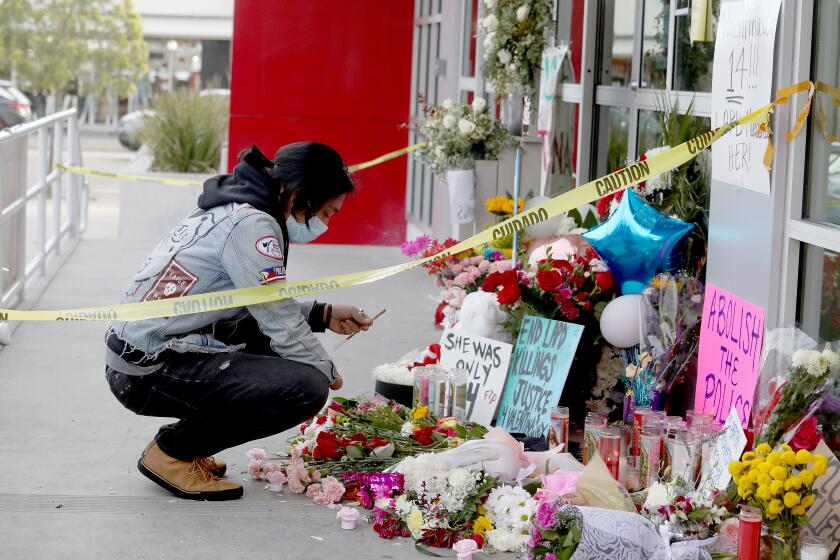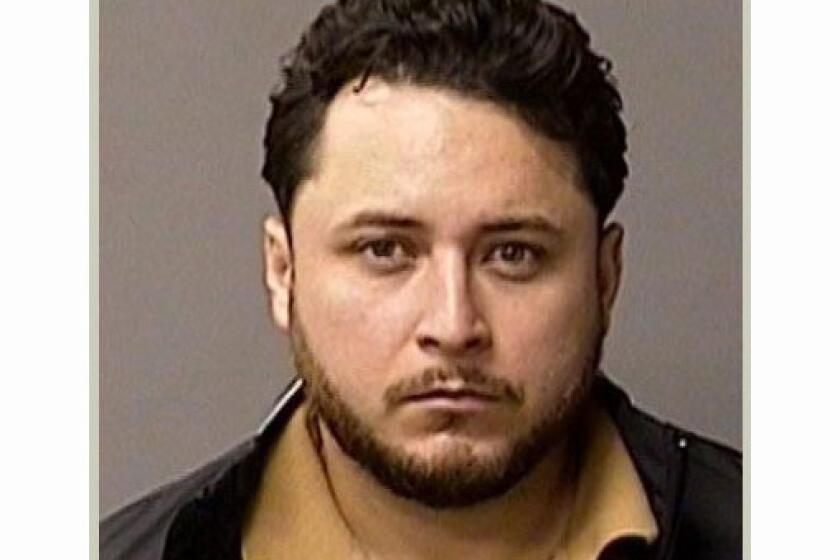Ban on Gays’ Ability to Wed Upheld
A state appeals court upheld a ban on same-sex marriage Thursday, ruling 2 to 1 that only the Legislature or voters can change California’s traditional definition of marriage.
“Courts simply do not have the authority to create new rights, especially when doing so involves the definition of so fundamental an institution as marriage,” William McGuiness, presiding justice of the 1st District Court of Appeal, wrote for the majority.
The ruling, which will be appealed to the California Supreme Court, overturned a trial judge’s decision last year that the ban violated the state Constitution. The state high court is expected to get the case by the end of the year.
Thursday’s ruling follows decisions against same-sex marriage by high courts in Washington and New York.
Some states also have amended their constitutions to thwart legal challenges by gay activists.
The high court of Massachusetts is the only top state court that has ended a ban on same-sex matrimony.
Ruling in the California case, the court’s majority said the historic definition of marriage did not deprive gays and lesbians of a fundamental right, particularly since same-sex unions have been protected under domestic-partnership laws.
“The time may come when California chooses to expand the definition of marriage to encompass same-sex unions,” wrote McGuiness, who was appointed by then-Gov. Pete Wilson. “That change must come from democratic processes, however, not by judicial fiat.”
By contrast, Gov. Arnold Schwarzenegger said last year that the ban on same-sex marriage was a matter for the courts to decide. Schwarzenegger vetoed a bill that would have permitted same-sex couples to marry.
In a written statement, Schwarzenegger said Thursday that the state’s marriage laws should be changed only by the courts or the electorate.
“The governor respects the court’s decision as this issue works through the legal process,” the statement said.
Justice J. Anthony Kline, in a blistering 51-page dissent, complained that the ruling diminished “the humanity of the lesbians and gay men whose rights are defeated.”
“Judicial opinions upholding blanket denial of the right of gay men and lesbians to enter society’s most fundamental and sacred institution are as incompatible with liberty and equality, as inhumane, as the many opinions that upheld denial of that right to interracial couples,” said Kline, an appointee of then-Gov. Jerry Brown. “Like them, such opinions will not stand the test of time.”
Justice Joanne C. Parrilli, a Wilson appointee, said in a concurring opinion that Kline had been swayed “emotionally” and overreached in applying the law.
“Marriage has historically stood for the principle that men and women who may, without planning or intending to do so, give life to a child should raise that child in a bonded, cooperative and enduring relationship,” Parrilli wrote.
The fact that state law recognizes that function “is hardly irrational,” she said. By the same token, the state’s domestic-partners law is aimed at protecting same-sex couples “in no small part, for the sake of the children involved.”
The ruling gives the California Supreme Court “an option to punt” on the marriage question by merely declining to review the appeals court decision, said Santa Clara University law professor Gerald Uelmen, an expert on the state high court.
But Uelmen and other lawyers said they expected the court to take the case and produce a fractured ruling.
“This is just too big an issue to let it be decided at this level,” Uelmen said.
University of Richmond law professor Carl W. Tobias said the majority relied heavily on the notion that it had to defer to the Legislature, a prevalent practice by judges who fear being labeled activist.
“It is kind of an easy way out,” Tobias said. He also predicted that the California Supreme Court would not be able to produce a unanimous decision, noting that other state high courts have been divided on same-sex marriage.
California’s high court has six Republicans and one Democrat. The court is viewed as cautious and moderate to conservative. It grappled with same-sex marriage two years ago when San Francisco Mayor Gavin Newsom allowed gays and lesbians to marry.
Without ruling on the constitutionality of the ban on same-sex marriage, the court decided that Newsom lacked authority to violate state law -- and invalidated the nearly 4,000 marriage licenses issued to same-sex couples in February 2004. Two of the seven justices dissented in the part of the ruling that nullified the licenses.
Shannon Minter, legal director of the National Center for Lesbian Rights, which represented 16 same-sex couples in one of the lawsuits before the court, complained that the “majority abdicated their judicial responsibility” Thursday.
“It is incorrect and unfair to say that the courts don’t have the responsibility to decide whether excluding a group of people from marriage is constitutional,” Minter said. “That is their job. That is exactly what the governor said.”
Conservative Christian groups involved in the litigation reacted with glee, even though the appeals court said they lacked standing in the case.
“It’s a crushing defeat for the same-sex-marriage movement,” said Mathew Staver, president and general counsel of Florida-based Liberty Counsel, the legal group that filed suit on behalf of Campaign for California Families.
Looking toward the appeal, Staver said Thursday’s ruling “sets us up nicely for the California Supreme Court.”
Glen Lavy, senior vice president of the Arizona-based Alliance Defense Fund’s Marriage Litigation Center, said the ruling was consistent with the decisions in the high courts of New York and Washington.
“That doesn’t mean the battle is anywhere near over,” Lavy said. “It just means it’s going to shift. Those who want to change marriage have failed to do it by the courts. If they are going to do it at all, they are going to have to do it by persuading people.”
Couples who had filed suit demanding the right to marry said the ruling devastated them, but they expressed hope that the state high court would overturn it.
Among the plaintiffs was Jeanne Rizzo, 60, of Marin, who has lived with Pali Cooper for 17 years. Together, they raised Rizzo’s son from a previous marriage.
“I’m tremendously disappointed,” Rizzo said. “We keep seeming to lose by one vote everything that’s important to us. It’ll go to the Supreme Court. I know we’re going to appeal it. But it’s hard to hear. It’s going to be hard to call my kid and tell him.”
At a news conference shortly after the ruling was issued, San Francisco City Atty. Dennis J. Herrera said the majority’s decision “lacked courage.” San Francisco was one of the litigants challenging the state’s marriage laws.
“If other courts had followed this reasoning, schools would still be segregated, and married couples would not be able to use birth control,” said Herrera.
Newsom, whose decision to marry same-sex couples ignited the litigation, said the ruling was “insulting” in its implication that domestic partnerships and civil unions were the equivalent of marriage.
“I am not going to say it was cowardly, but it was hardly groundbreaking,” Gavin said. “It talked about tradition. It talked about procreation. Give me a break.”
leora.romney@latimes.com
More to Read
Start your day right
Sign up for Essential California for news, features and recommendations from the L.A. Times and beyond in your inbox six days a week.
You may occasionally receive promotional content from the Los Angeles Times.








